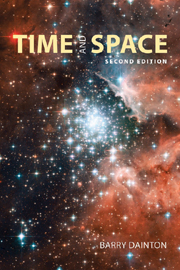Book contents
- Frontmatter
- Contents
- Preface to the second edition
- Preface to the first edition
- 1 Preliminaries
- 2 McTaggart on time's unreality
- 3 The Block universe
- 4 Asymmetries within time
- 5 Tensed time
- 6 Dynamic time
- 7 Time and consciousness
- 8 Time travel
- 9 Conceptions of void
- 10 Space: the classical debate
- 11 Absolute motion
- 12 Motion in spacetime
- 13 Curved space
- 14 Tangible space
- 15 Spatial anti-realism
- 16 Zeno and the continuum I
- 17 Zeno and the continuum II
- 18 Special relativity
- 19 Relativity and reality
- 20 General relativity
- 21 Spacetime metaphysics
- 22 Strings
- Notes
- Glossary
- Web resources
- Bibliography
- Index
6 - Dynamic time
- Frontmatter
- Contents
- Preface to the second edition
- Preface to the first edition
- 1 Preliminaries
- 2 McTaggart on time's unreality
- 3 The Block universe
- 4 Asymmetries within time
- 5 Tensed time
- 6 Dynamic time
- 7 Time and consciousness
- 8 Time travel
- 9 Conceptions of void
- 10 Space: the classical debate
- 11 Absolute motion
- 12 Motion in spacetime
- 13 Curved space
- 14 Tangible space
- 15 Spatial anti-realism
- 16 Zeno and the continuum I
- 17 Zeno and the continuum II
- 18 Special relativity
- 19 Relativity and reality
- 20 General relativity
- 21 Spacetime metaphysics
- 22 Strings
- Notes
- Glossary
- Web resources
- Bibliography
- Index
Summary
The Growing Block
In Scientific Thought, after a clear statement of the problems posed by supposing that there are transitory tensed properties, Broad proposes a very different dynamic theory of time. Focusing on his current state, he says that this:
is just the last thin slice that has joined up to my life-history. When it ceases to be present and becomes past this does not mean that it has changed its relations to anything to which it was related when it was present. … When an event, which was present, becomes past, it does not change or lose any of the relations which it had before; it simply acquires in addition new relations which it could not have before, because the terms to which it now has these relations were then simply non-entities.
It will be observed that such a theory as this accepts the reality of the present and the past, but holds that the future is simply nothing at all. Nothing has happened to the present by becoming past except that fresh slices of existence have been added to the total history of the world. The past is thus as real as the present. On the other hand, the essence of a present event is, not that it precedes future events, but that there is quite literally nothing to which it has the relation of precedence.[…]
- Type
- Chapter
- Information
- Time and Space , pp. 68 - 102Publisher: Acumen PublishingPrint publication year: 2010

